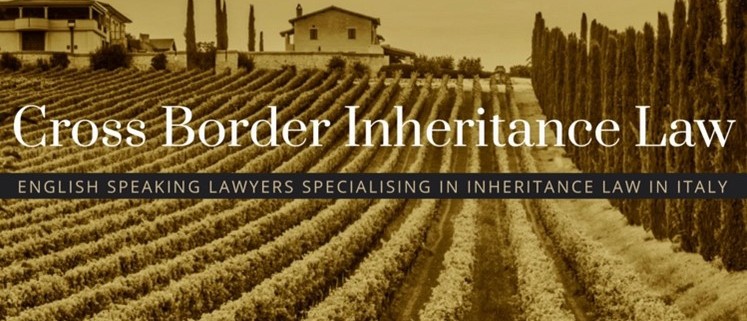Cross border inheritance in Italy
Italian inheritance law
Many of our clients own property at home and here in Italy. We frequently receive questions about how cross border inheritance in Italy works.
Law no. 218 of 31st May, 1995 regulates the field of Italian inheritance law in the framework of international private law.
Habitual residence of the deceased at the time of death determines the national law which governs succession.
Italian Inheritance legislation adopts the principle of “unity of inheritance”. This principle differs substantially compared to legislation in common law countries. Italian law makes a distinction between a division of movable and immovable assets. Movable assets are subject to the law of the last domicile or last residence of the decedent. Immovable assets are subject to “lex rei sitae” (law of the country where property is located).
Get Your FREE Guide to Planning Your Inheritance in Italy
Our PDF guide explains the ins and outs of preparing your inheritance under Italian law
Download nowOne of the most important consequences of asset divisions is that, if a decedent’s estate includes properties located in different countries, the succession of each individual property could be regulated by the law of the country where the property is located.
Cross border inheritance law: deferment to the law of another country
Italian rules governing conflicts of law consider the possibility that the national law of a deceased foreigner might defer to the law of another country.
Here is a practical example. A deceased English national resident in England owned property in Italy. The law of England and Wales therefore governs succession. However, in accordance with the conflict of law of England and Wales, the law applicable to properties abroad is, “lex rei sitae (law of the country where the property is located). This means, Italian succession law governs the assets in Italy.
In 2015, the EU introduced regulations whereby a testator can elect which country law should regulate all assets. This could be the law of the country in which the testator is habitually resident or the country of the testator’s nationality. This choice of law has to be formally expressed in a will. In addition, it must not prejudice the rights that the Italian law provides for forced heirs, “legittimari”. These are members of family, resident in Italy when the testator dies. Although it may be against the testator’s wishes, forced heirs must receive a legally determined share of the estate.
An Italian will is the best option to manage cross border inheritance in Italy
If you own assets at home as well as in Italy, it is highly advisable to draft an Italian will for your Italian assets. In order to limit the consequences of “legal succession”, you should seek legal advice in this matter. If a decedent died intestate, that is without a Will, Italian Inheritance law determines which relatives of the deceased have a right to inherit an estate. This will primarily be the spouse, the legitimate and natural children, and any ascendants. Where no heirs are traceable, Italian assets go to the Italian State.
Finally …
If you would like more details about Italian succession law and procedures, we have produced a comprehensive Italian Inheritance Guide, which we hope you will find helpful. If you would like to discuss a specific case, we are here to help.
Get All Our FREE Guides for Foreigners Planning to Buy, Sell or Live in Italy
Our PDF guides give you all the knowledge you need to move your Italian dream forward with confidence
Download now









